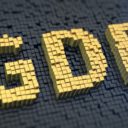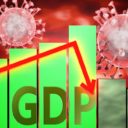The U.S. economy contracted in the first quarter for the first time in three years, at least technically. The government changed how it calculated GDP in 2012, which makes widely circulated GDP comparisons an apple and oranges comparison. Economists immediately blamed the severe winter weather, while continuing to point to signs economic activity has since rebounded.
The Commerce Department on Thursday made a downward revision to its growth estimate to show gross domestic product, or GDP contracting at a 1.0 annual rate. This is the worst economic performance since the first quarter of 2011, and showed a much weaker pace of inventory accumulation, as well as a wider than previously estimated trade deficit.
The government had previously estimated GDP growth expanding at a 0.1 percent rate, but that measurement included trade gap figures that were later revised. People’s Pundit Daily calculated the contracted to be roughly 0.7 percent, but the report topped that number. It is not unusual for the government to make sharp revisions to GDP numbers as it does not have complete data when it makes its initial estimates.
Wall Street’s and economists’ expectations forecast revisions to show GDP contracting at a 0.5 percent rate.
The economy was estimated to have grown at a 2.6 percent pace in the fourth quarter. There has been some signs of turnaround this month, but that seems to be the pattern for the last five years.
From employment to manufacturing data, reports this month suggest growth will increase in the second quarter, though disappointment in a lack of staying power is becoming the sad seasonal norm.
While economists wildly estimate that the cold weather could have cut as much as 1.5 percentage points from GDP growth, the government made no reference and gave no details involving the impact of the weather. This suggests the theory is simply not viable at this point in the season.
Businesses accumulated $49.0 billion worth of inventories, which was far less than the $87.4 billion estimated last month. Even though “experts” and economists were taken by surprise by the report, recent surveys showed the American were not, at all.
Prior to the report, the Rasmussen Consumer Index, which measures consumer confidence on a daily basis, dipped less than one point last Thursday to 102.8. Consumer confidence was down four points from a week ago, up two points from both one month ago and three months ago. But the disconnect between Main Street and Wall Street is astonishing. the Rasmussen Investor Index was down two points on Thursday at 120.5. Confidence was also down two points from a week ago, up one point from a month ago, and up five points from three months ago.
Overall, 49 percent of Americans said the U.S. economy was in a recession.
Similarly, Gallup’s U.S. Economic Confidence Index was -15 for the week ending May 25, its ninth consecutive week at or near this level. The index slumped a bit in early March, ranging from -18 to -20, but has fluctuated narrowly between -14 and -17 since.
Consumer spending, which accounts for more than two-thirds of U.S. economic activity, increased at a 3.1 percent rate, while it was previously reported to have increased at a 3.0 percent pace. However, it is what Americans are spending money on that is hurting economic growth.
The Affordable Healthcare Act, or ObamaCare, expanded healthcare coverage to many Americans. Yet, consumer spending on health insurance has skyrocketed along with the cost increases forced by the law, leaving little for other sectors in the fourth and now first quarters.
Business spending on nonresidential structures, including gas drilling, contracted at a 7.5 percent rate. The previous estimates were way off, as it had previously been reported to have increased at a 0.2 percent pace. The report showed corporate profits after tax plunged at a 13.7 percent rate, which was the biggest drop since the fourth quarter of 2008.





